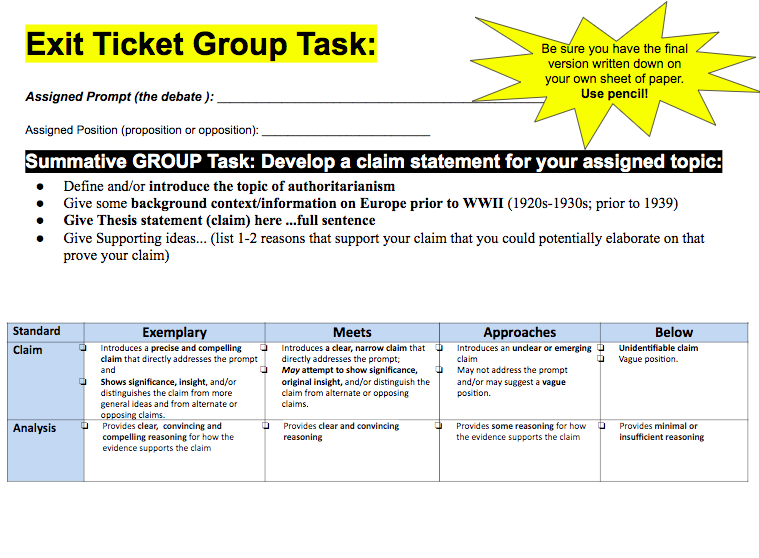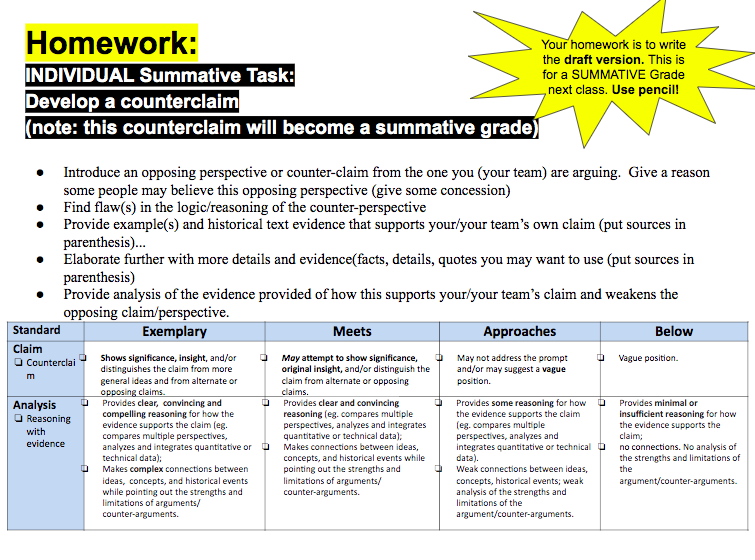First, decide on roles.Consider which group member has the strongest counterclaim -- they should probably take that speaking role. Then make decisions for the other roles (based on the number of people in your team--seed slides below). Any other members not presenting their counterclaim in the speech can potentially use their counterclaim (evidence, reasoning, etc.) for one of the rebuttals--each team members' counterclaim can still be of use in the debate. Next, work on your speech.Again, see the slides for speaking roles and focus on what needs to be accomplished for your role. Also, remember to look at the rubric (see below). This is important so that you remember what you are specifically being summatively assessed on. Every speaking role is required to use evidence --both verbally as well as incorporating an image as a form of evidence; the visual will be on your slide and you are required to reference it in your speech. You need to appeal to logos and ethos. Be aware of the importance of engaging with your audience (eye contact, tone, speaking in a cadence/speed that allows them to follow your speech as well as projecting your voice that allows even those in the back of the room to hear you). This is also something that factors into your overall grade for your speech. Then, develop your slide.Remember, the slide is meant to enhance your speech--not compete with it. Choose an image that you can easily work into your speech and reference it--this is not just pointing to it but using it to help emphasize a point you want to make or help your audience see something you are trying to make a point about in your speech. Choose an image that works well. Primary source images are generally best. Please, no memes or clipart. Links for Team Slide Deck Presentations:
HW: Prepare for next Class' DebateTips for preparation:
Helpful Videos for Preparing For Your Speaking Role in a Debate:
Revise Your Counterclaim...Resources to help you with this summative task: Philosophy and Ethics of Leadership and Governance (Russia Debate):
Resources to help you with developing a counterargument and writing a Counterclaim paragraph:
HW: Continue Research and Find Supporting Evidence. Take Notes (in group document).Topic-Specific Resources:
(note: Some of these are credible, reliable sources and others are less scholarly and credible. Use good judgement in which additional sources you use for building your background information vs. using for a source for evidence) Rise of Authoritarianism - Pre-World War II
Rise of Communism in Russia:
Rise of Nazism in Germany:
Rise of Fascism in Japan:
You are welcome to do your own additional research and use sources you find on your own. Please be sure to use CREDIBLE/SCHOLARLY sources (e.g., ABC-CLIO, Encyclopedia Britannica, published government documents, primary sources, etc.). Do not use non-scholarly sources for your evidence in your counterclaim or in your speech (e.g. History.com, Crash Course videos, Ducksters, AlphaHistory, Quora, Wikipedia, etc.) Day 1: Work with your group to take notes.Today, your task is to begin working with your group to take notes and find evidence that will help support the position your team has been assigned to. Step 1: Create a group shared document. You will use this document to collectively add notes and evidence that helps support your position. Use the same strategy as you did with your formative debate group and formative speech group-- use a strategy such as creating a table, using color-coding, etc. to differentiate where within the document each person is contributing notes and to help track and hold each member accountable for contributing notes. Use the DBQ packets Jigsaw this out-- assign each team member a different job or section of the DBQ to take notes from. Divide and conquer! Resources to help you research your assigned topic:DBQ Packets for your Team’s Research:
Topic-Specific Videos: (note: Some of these are credible, reliable sources and others are less scholarly and credible. Use good judgement in which additional sources you use for building your background information vs. using for a source for evidence) Rise of Authoritarianism - Pre-World War II
Rise of Communism in Russia:
Rise of Nazism in Germany:
Rise of Fascism in Japan:
You are welcome to do your own additional research and use sources you find on your own. Please be sure to use CREDIBLE/SCHOLARLY sources (e.g., ABC-CLIO, Encyclopedia Britannica, published government documents, primary sources, etc.). Do not use non-scholarly sources for your evidence in your counterclaim or in your speech (e.g. History.com, Crash Course videos, Ducksters, AlphaHistory, Quora, Wikipedia, etc.)  Step 2: Develop a claim statement. Towards the end of class, your team members will need to draft a claim statement. Start with drafting this on the dry-erase board. After you have a claim statement + reasons that you all agree upon, it will be important to record this on the handout (salmon colored paper handout) so that you can refer to it when you need to draft a counterclaim statement for homework. Note: The group claim statement is not for a grade but will be what you will most likely be using in your speech so it does matter. It will be the job of whomever is assigned as the Opening Speaker to make the claim stronger and add the introduction and further reasoning and evidence. The group does not need to do anything more than draft the agreed upon claim statement and reasons (no evidence needed yet). HW: Develop a Counterclaim StatementUse the handout provided to draft your counterclaim. Use the following document if you lost your copy of the handout: Please note the claim is something you will develop as a group. This is NOT scored for a summative grade. You are however expected to INDIVIDUALLY develop a counterclaim. This counterclaim will be graded. This task is individual work--not group work. It is due at the start of next class. You will have an opportunity for feedback and then you will resubmit it for a SUMMATIVE score. Exemplars to help you with this summative task: Today you and your group will present your 1 minute/1-slide presentations to your peers. While you are presenting, the audience will be watching and providing constructive feedback to help you identify your strengths and weaknesses with public speaking and in presenting historical information while using supporting evidence in a speech. This is a chance to practice the skills needed in "constructing arguments" and also in your ability to capture and hold an audience attention through voice projection, tone, speech cadence, eye contact, visuals, etc. Link you will need for class today:
HW: Read "We Wage a Wider, Crueler War"Read: The Human Story, CH. 20 “We wage a wider crueler war” (pp. 323-350) -- its a long chapter but this will help you with background information you will need for the summative tasks (summative claim and counterclaim and summative debate). I recommend taking some notes in your Unit 3 notes document. Alternatively, you could make a copy of the PDF and add it to your own Google Drive folder and annotate the PDF by adding comments. Today you will work within your group to respond to one of the assigned DBQ questions. You will prepare your group's response in presentation format:
Helpful Resources for Today's Class:
HW: Prepare a 1-minute speech + slideBe sure when you arrive to the next scheduled class you are ready to present.
Presentation Tips: If you look at the rubric you will see that it is important that your presentation topic addresses the question in some part and that you provide evidence to support your idea(s) and reference your source(s). You should also be sure the image you select for your slide is relevant to the ideas you discuss. Your image can be used as a piece of evidence.
Speech Tips: You are allowed to have notes (note card, sheet of paper) with you when you present. Try to avoid reading from your notes the whole time or reading from your slide (your audience is capable of reading the text on your slide).
|
Mrs. Stewart's CourseYou'll find a daily agenda posted here for each day that class meets Archives
May 2020
Categories |

 RSS Feed
RSS Feed